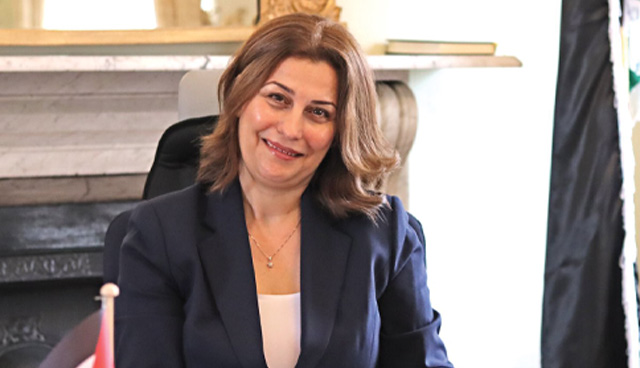De facto annexation of Palestine

The passing of the Annexation of Palestine motion in Dáil Éireann was a landmark moment in European politics writes Jilan Wahba Abdalmajid, Ambassador of the State of Palestine to Ireland.
The cross-party support for the Sinn Féin motion made Ireland the first EU country to declare the settlement activities of Israeli occupation in Palestinian territories “de facto annexation”.
The motion condemned the “recent and ongoing forced displacement of Palestinian communities in the occupied Palestinian territory” and described the annexation of Palestinian territory as a violation of international law.
Minister Simon Coveney’s statement that “the scale, space and strategic nature of Israel’s actions on settlements, demolitions and evictions is de facto annexation” was broadcast worldwide and started an important conversation about the necessity of the international community stepping up and taking responsibility to ensure accountability for Israeli crimes.
To me, as the Ambassador of the State of Palestine, the passing of the motion reflected the sincere support that the people of Ireland have for the Palestinian cause and our right to freedom. The affinity between our people is a deep and lasting one and has meant that Ireland has led the way in Europe in putting the Palestinian cause on the agenda.
Last summer, Israel announced that it would annex large swarths of the West Bank. The Jordan Valley in Area C of occupied Palestine would be officially considered part of Israel. The political and economic impact of annexation of this key strategic area would prevent Palestinians from having our own sovereign, contiguous state and would leave the West Bank split into a series of South African style bantustans.
The announcement faced condemnation from the international community. Though Israel subsequently agreed that it would halt its plan, the reality is that on the ground, annexation and the seizure of Palestinian lands continues unabated.
Six-hundred-and-fifty-thousand settlers live in more than 250 settlements and outposts build on stolen Palestinian land. The separation wall was built inside the Occupied State of Palestine, thereby de facto annexing Palestinian lands, agriculture and water resources and restricting freedom of movement. Israel uses the wall and other elements of its ever-expanding settlement enterprise in the Occupied State of Palestine to unilaterally impose its own final status vision on the ground. The wall and illegal settlements create the political, economic, and social impact of entrenching apartheid and is tantamount to de facto annexation as the International Court of Justice advised in 2004.
Israel’s colonial project in Palestine, which started in the 19th century and continued during the British mandate, has overseen the displacement of hundreds of thousands of Palestinians over the years, creating the largest refugee community in the world. The process continues today in Sheikh Jarrah and Silwan. Hundreds of Palestinians are currently protesting over Israeli court orders to forcibly hand their homes to settlers. Under Israel’s discriminatory laws, any Jewish person can move to Israel and live in a home from which Palestinians were expelled. Under those same laws, no Palestinian has the right to return to their stolen home. This unjust legal framework has enabled Israeli occupation authorities to keep expelling and displacing Palestinians and encouraging and enabling settlers to attack Palestinians on their own lands. These violent extremists have gone as far as burning families to death in their homes.
The passing of the annexation motion confirmed Ireland’s commitment to the upholding of international law, particularly its obligations under the Geneva Conventions of 1949, and sets an example to other states to uphold their obligations and ensure accountability for breaches of those laws by the occupying power.
The collaborative approach of Irish parliamentarians and civil society organisations such as Sadaka, Trócaire, Christian Aid and ICTU must be commended. They were united in their goal of upholding the human rights of Palestinians. The work behind the scenes from committed individuals such as Senator Frances Black and Dr Susan Power has been instrumental in achieving progress on justice for Palestinians and we owe them our thanks.
The State of Palestine, our President, our Minister of Foreign Affairs and expatriates and most of all our people are grateful for Ireland’s principled stance on peace and justice for Palestine. The affinity between our two nations is longstanding and held dear by us, and long may it continue.





